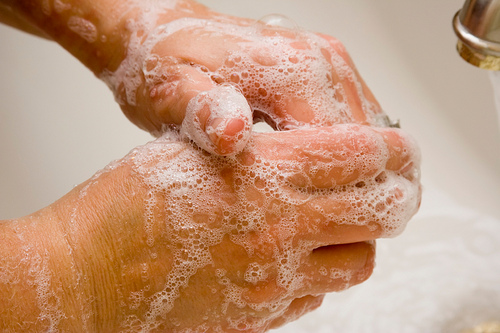Antibacterial soaps have been widely used since the 70s, but it wasn’t until recently that their drawbacks were taken seriously. A couple years ago the FDA announced that manufacturers had to prove that antibacterial soaps were effective and not a threat to public safety. Fast forward to September of last year, and the FDA has banned antibacterial hand soaps and body washes altogether. To figure out why, you need to have an understanding of drug resistance.
Unfortunately, many of the tools we have to fight bacterial diseases all stem from a single discovery nearly a century old: Penicillin. While Penicillin is an incredibly effective antibiotic, there’s a reason you can’t just walk into a doctor’s office and get a prescription for it. While ultimately any antibiotic is destined to become ineffective, overuse or misuse of antibiotics can speed up the process by which bacteria develop a resistance.
This can happen in a number of ways. If an antibiotic treatment is stopped prematurely, then those surviving bacteria — slightly more resistant than the others — will be the ones who go on to reproduce. It’s also why doctors will often prescribe other forms of Penicillin before Penicillin itself, like Amoxicillin, and why antibiotics shouldn’t be used on relatively minor infections because every time an infection is exposed to an antibiotic there is a chance that a resistance will develop. The human immune system has the ability to fight off minor infections. The overuse of antibiotics, while they might make people’s lives slightly easier in the short term, has terrible consequences in the long term.
Antibacterial soaps work slightly different but can have the same effects. When they are used all the time, the only bacteria left in people’s hands will be the ones that are resistant and ultimately they will spread to everything you touch.
What’s more, besides drug resistance, overuse of antibacterial soap can lead to other developmental effects in children. Children who are exposed to Triclosan, the main ingredient in antibacterials, have a higher rate of peanut and other allergies. It has been hypothesized that this is because exposure to bacteria is necessary for the development of the immune system.
This is what led the FDA to ban Triclosan and a number of other ingredients in household antibacterials. While it’s great to have them off American shelves, it’s still a huge problem that we will have to contend with. The third world uses antibacterials and antibiotics like crazy, driven in part by a lack of understanding of different diseases and inadequate international response to disease outbreaks. The problem is so prevalent that the World Health Organization has called the pace of drug resistance a threat to global security.
We need to get on top of this problem, both by combating the misuse of antibiotics and by helping other countries transition away from antibacterial soaps. Alcohol-based soaps are just as effective and instead of targeting a bacteria’s enzymes, alcohol-based soaps dehydrate and kill bacteria uniformly.
We also need to get better at responding to outbreaks in the third world. Doctors, especially unskilled ones, tend to default to what they know has worked in the past. Often this means that antibiotics are prescribed even when they will have no effect. A more comprehensive international response to these outbreaks and to the education of doctors in the third world would go a long way.
It’s also important that Americans understand these processes. While antibacterial body washes and hand soaps might be banned in the U.S., people can still buy antibacterial hand sanitizers and wipes. Overuse of these things is the same as overuse of soap. Having an obsessive attitude towards cleanliness, ironically, can do more harm than good. It’s important that everyone is educated about the dangers of drug resistance.


